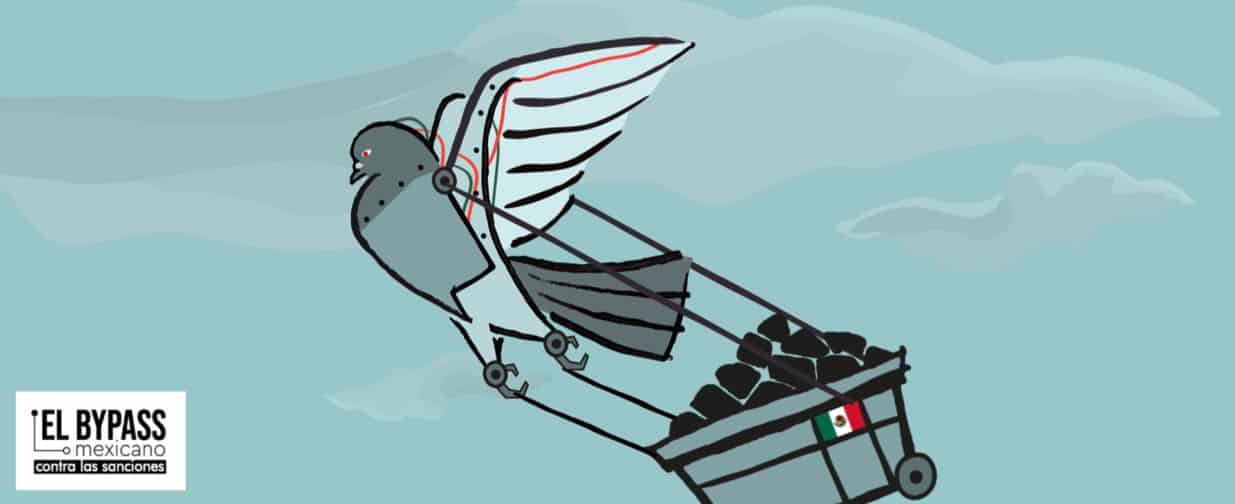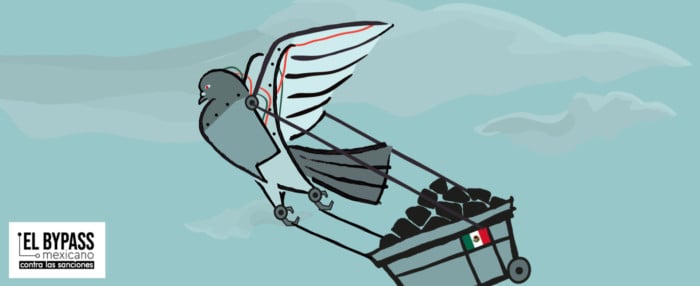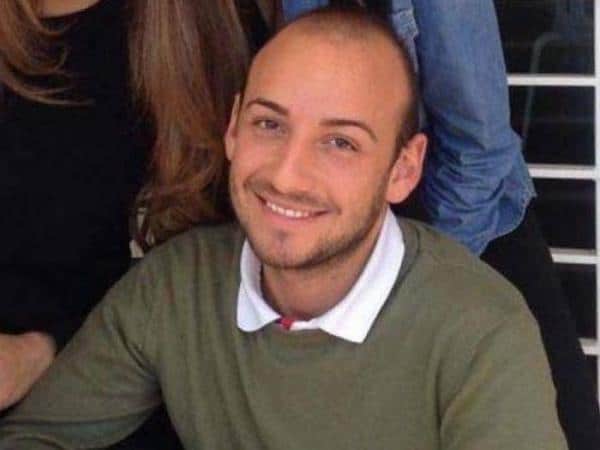

The business structure that Alex Saab had registered in Turkey—revealed in 2018 in an article by Armando.info—was merely a false start for his plans to export Venezuelan coal. Almost simultaneously, the Colombian merchant made contact with his Mexican counterpart, Joaquín Leal, to plot a network that would not only market crude oil from Venezuelan state oil company PDVSA, as part of a maneuver to bypass the sanctions imposed by Washington, but would also take charge of a scheme to export coal from the mines of Zulia, in western Venezuela. The dirty play allowed that thousands of tons, valued in millions of dollars, ended up in ports in Mexico and Central America.
|
Getting your Trinity Audio player ready...
|
Documents obtained by EL PAÍS and Armando.Info on the network of Libre Abordo and other companies, which although based in Mexico, extended to 30 countries; documents that number into the thousands and serve as input for the investigative journalistic series “Mexican Bypass against Sanctions,” detail in many communications the participation of Leal and Saab in the coal business.
Since mid-2019, Alex Saab —detained in Cape Verde on June 12, 2020, and indicted on money laundering charges by a Miami court, where he could be extradited— and Joaquín Leal controlled a good part of PDVSA’s production with the marketing of crude oil through Mexican company Libre Abordo. Consequently, last year, the U.S. Department of the Treasury included the Mexican businessman in the so-called Clinton List of the OFAC (Office of Foreign Assets Control of the Department of the Treasury), where Saab and his partner, Álvaro Pulido Vargas, were listed since mid-2019. Along with that core oil operation, Saab and Leal expanded their lineup of Venezuelan products by incorporating coal from Zulia.
A presidential decree published in Official Gazette No. 41.472 of August 31, 2018, announced the creation of the “joint venture” between state-owned Carbones del Zulia (Carbozulia) and the unknown Turkish company, Glenmore Proje Insaat. That authorization by Nicolás Maduro displaced the 2017-alliance between Colombian-Panamanian Inter American Coal and Carbozulia to make way for Alex Saab as a partner of the Venezuelan State. The Colombian businessman remained in the shadows, as in most of his activities with chavismo, but his collaborators appeared in the documents of the companies created ad hoc for the occasion.
The trace left in the articles of incorporation of Glenmore Proje Insaat leads to Lorenzo Antonelli, a 28-year-old Italian young man, director of several companies devised by the Colombian businessman and, more importantly, his brother-in-law. The company also has legal status in the United Kingdom, where Antonelli was a director. The scheme repeated the pattern followed with gold, where Antonelli was hidden behind another Turkish company that teamed up with Minerven when the state-owned company was already run by Adrián Perdomo Mata, a former employee of Saab and Pulido.

Antonelli’s ties to the business dealings of the businessman arrested a year ago in Cape Verde have been revealed in police investigations, like the one carried out by the Italian Guardia Di Finanza, which linked him and Saab’s wife to possible money laundering operations.
For the coal business, Glenmore’s attempt was only the first step. Joaquin Leal and his operations in Mexico completed the circle. That country had already served as a base for Alex Saab and Álvaro Pulido’s business, at least since 2016. From there, they bought and shipped thousands of CLAP boxes with poor quality food for Maduro’s regime after guaranteeing themselves millionaire contracts through companies from Hong Kong, first, and then from Turkey and the United Arab Emirates. In October 2018, the then Attorney General’s Office in Mexico confirmed the irregularities in the business and opened an investigation against several of those companies, but they finally got off with minor fines. So that this precedent did not inhibit them from adopting Mexico again as a base for their venture with Venezuelan coal.
Once Alex Saab’s relationship with Joaquín Leal was consolidated, the business in Mexico multiplied. The success of the duo can be measured by the sudden rise in 2019 of Venezuelan coal exports, which had been sluggish for years.
“I am writing you to establish a first contact and make us known as a company. We have managed to gain access to a very high-level coal source and I would like to make ourselves available to offer you a first trial shipment.” So begins an email sent on April 3, 2020 from Imperium DMCC to several prospective customers for the purchase of the mineral.
Imperium DMCC was registered in 2018, in Dubai, one of the United Arab Emirates. Although it has Gyagkos Stylianou, a Greek, and Omeros Nishiotis, a Cypriot, as directors, it is actually another company of Joaquin Leal’s extensive portfolio. With this company, the team of the Mexican businessman and Alex Saab negotiated in May of last year the arrival in Venezuela of at least five ships of Iranian gasoline, and also sought to bring foodstuffs from Mexico. In communications obtained by Armando.Info and EL PAÍS, Imperium DMCC acts as a trader of the Venezuelan coal.
“This week, we finished loading the first spot cargo of 30,000 MT with the following specifications attached. This is the first cargo of a 3,080,000 MT +/- 3% forward contract,” continued that April 3, 2020 email. That contract alone far exceeded the 80,000 MT that Carbozulia produced in 2018, as company’s workers reported at that time. Four days before that email, the Venezuelan customs agency published on Twitter that they were carrying out the “recognition” of 41,000 tons of coal that would be exported, precisely from the “dock of Carbozulia.”
Any doubts that potential clients might have about the origin of the coal were cleared up in an email sent on May 25, 2020, addressed to the authorities of the port of Lázaro Cárdenas, on the Mexican Pacific coast. “We have a contract for 3 million tons with Carbozulia, 120,000 MT of which were already exported to Altamira [another Mexican port], sold on a spot basis to CFE (...) We would be very interested in taking our product to the TPP terminal in Lázaro Cárdenas to store it there temporarily and enable the sale operation to CFE from this point.”
The email also included the technical specifications of the product taken from the Paso Diablo mine, exploited by Carbozulia. Although in that communication it was assured that Imperium DMCC had already sold 120,000 tons to the Mexican Federal Electricity Commission (CFE) and that Joaquín Leal had experience in the Mexican electricity market, there are no indications that those deals have materialized.
Instead, the communications and documents reviewed jointly by Armando.Info and EL PAÍS reveal the pressure to try to sell and store the coal assigned to Leal.
In addition to Mexico, Leal’s team sought to place the mineral in Guatemala, Honduras and the Dominican Republic. In no case is there evidence that the attempts were successful. As recorded in hundreds of emails, the coal was offered to companies, such as Trafigura, a global commodities trading giant with headquarters in Geneva and Singapore; or BB Energy, a Lebanese consortium that appears in the Mossack Fonseca documents contained in the so-called Panama Papers for managing an offshore company in the isthmus that traded millions of dollars of Russian oil in Latin America during the nineties.
In some communications, Imperium DMCC claims to act on behalf of Mexican company Suministradora Bennu. Enrique Woodhouse, the owner of Bennu, explained for this article that Joaquín Leal asked his company to receive the coal on consignment, imported from Venezuela free of charge, until the deal with the Mexican state electricity company CFE could be closed. But the origin of the goods, according to the shipping documents, was not Carbozulia, but Glenmore, the Turkish company behind which is Alex Saab’s brother-in-law, Lorenzo Antonelli.
The link of Imperium DMCC, Leal’s trading company, with Alex Saab was also evidenced in writing in the company’s exchanges. “We cannot carry on this cooperation with Alex Sabb [sic],” reads one of the emails that the Liberian-flagged Ceto Shipping sent to the company, in that case, after more than 100 days of disagreements over the payment of one of the fuel cargoes from Iran. This dispute was reviewed last year by Bloomberg agency.
The business explains the rebound in Venezuela’s coal exports, which in 2019 accounted for some US$ 40 million, as Reuters reviewed. In 2020, the figures soared higher —one destination alone, the United Kingdom, received 460,000 tons of the Venezuelan mineral, valued at US$ 46 million, while almost 220,000 tons arrived in Spain for US$ 23 million, according to United Nations trade statistics.
All the e-mails sent by Imperium DMCC, offering the Venezuelan coal, bear the signature of Alex Rodríguez, a relatively common combination of first and last name in Spanish and the namesake of the former Major League Baseball player, a star of the New York Yankees, among other teams. But there is a code that makes it possible to decipher that the sender adopted a pseudonym, as at the time he played with anagrams. In the communications, the name was almost always accompanied by a telephone number that, in reality, matches that of Axel Galit Capriles Hernández, a young Venezuelan businessman with experience as a commodities broker and son of the well-known psychologist, Axel Capriles Méndez, who in recent years has been involved in the real estate business in Madrid.
That telephone number is the same one that Armando.info called months ago to contact Axel Capriles Hernández (junior) before the publication of a first report on his connection with Joaquín Leal. Just as on that occasion he declined to comment, this time he did not respond to a request for an interview to clarify the use of the pseudonym Alex or other aspects of his relationship with Joaquín Leal.
In a communication sent to the authors after the publication of this report, Axel Capriles — through his lawyer in Madrid, Efrén Díaz— denies that he is actually Alex Rodríguez or that he has ever used such a pseudonym.
Before signing Imperium DMCC’s communications, that name and alleged alias of Alex Rodriguez already appeared in 2019 as a trader of Libre Abordo, the Mexican company that negotiated tanker trucks and corn in bulk with the state-owned Corpovex in exchange for Venezuelan oil, and which in June 2020 triggered the sanctions by the Department of the Treasury against Joaquin Leal for considering him as the head of a scheme to evade sanctions against PDVSA, imposed in early 2019.
On one occasion, the mask of the pseudonym was uncovered by the interlocutors. That email claiming the failure to pay, sent by the shipping company, Ceto Shipping, to Imperium DMCC was precisely addressed to “Axel G”.
The Venezuelan businessman’s lawyer, Efrén Díaz, acting as his spokesman in a written letter, insists that the inclusion of Axel Capriles’ name in that email was a “mistake,” but fails to provide proofs to support this statement. According to the lawyer, the confusion arose “because a wrong email was mistakenly sent to Mr. Capriles Hernandez, an email which he never had access to nor was he aware of it.”
The partnership of Axel Capriles with Joaquín Leal has been confirmed – for some time now – in companies like Generadora de Electricidad y Gas in Mexico, registered in Guanajuato, capital city of the state with the same name in central Mexico. His lawyer acknowledges from Madrid the partnership between Capriles and Leal, but points out that it was “a brief association” in that electricity company, which did not prosper in the end, and “the legal issues” of Joaquín Leal “accelerated the early closing of the project.”
Sources familiar with Joaquín Leal’s business dealings, as well as the role that Axel Capriles Junior played in Mexico, confirm that Alex Rodríguez was a pseudonym of the young Venezuelan. “Axel’s nickname is Alex Rodríguez. He used a fake WhatsApp account for his conversations with PDVSA,” states a businessman, who prefers anonymity.
Those versions are also denied by lawyer Efrén Díaz, representative of Axel Capriles Hernández. “Mr. Capriles Hernández has never participated in any oil or coal process, negotiation, project or scheme nor with the persons mentioned.”
After the sanctions of Donald Trump’s administration against Joaquín Leal, Axel Capriles’ trace in Mexico vanished. The telephone number provided in the emails with the name of Alex Rodriguez seems to be inactive. In digital media in Spain, there have been recent statements by Capriles Hernández promoting Totam Technologies Inc, a mobile payment application in gas stations.
The platform belongs to Totam Servicios Tecnológicos, a company registered by Axel Capriles in Monterrey, in May 2019, when he was also a trader of Venezuelan coal in the scheme devised by Alex Saab and Joaquín Leal to evade U.S. sanctions against the Chavista regime.
* This is the third installment of the series "Mexican Bypass against Sanctions" that Armando.info produced and publishes jointly with the newspaper EL PAÍS of Madrid.
NOTE TO READERS. During the reporting process of this article, the editors tried to get Axel Capriles Hernández’s version, among that of others mentioned, but he did not respond to the journalistic requests. Only after the piece was published, Mr. Capriles Hernandez’s lawyer in Spain sent a letter to the editors of EL PAÍS and Armando.info with some comments regarding the article and his version of the matters in which he is mentioned. For the sake of a more comprehensive understanding of the story and, in accordance with the ethical standards of both publications, some quotes from that letter were added to the original text, quotes included in the section under the crossheading “Alex was Axel.”
When Vice President Delcy Rodríguez turned to a group of Mexican friends and partners to lessen the new electricity emergency in Venezuela, she laid the foundation stone of a shortcut through which Chavismo and its commercial allies have dodged the sanctions imposed by Washington on PDVSA’s exports of crude oil. Since then, with Alex Saab, Joaquín Leal and Alessandro Bazzoni as key figures, the circuit has spread to some thirty countries to trade other Venezuelan commodities. This is part of the revelations of this joint investigative series between the newspaper El País and Armando.info, developed from a leak of thousands of documents.
Leaked documents on Libre Abordo and the rest of the shady network that Joaquín Leal managed from Mexico, with tentacles reaching 30 countries, ―aimed to trade PDVSA crude oil and other raw materials that the Caracas regime needed to place in international markets in spite of the sanctions― show that the businessman claimed to have the approval of the Mexican government and supplies from Segalmex, an official entity. Beyond this smoking gun, there is evidence that Leal had privileged access to the vice foreign minister for Latin America and the Caribbean, Maximiliano Reyes.
As part of their business network based in Mexico, with one foot in Dubai, the two traders devised a way to replace the operation of the large international credit card franchises if they were to abandon the Venezuelan market because of Washington’s sanctions. The developed electronic payment system, “Paquete Alcance,” aimed to get hundreds of millions of dollars in remittances sent by expatriates and use them to finance purchases at CLAP stores.
Scions of different lineages of tycoons in Venezuela, Francisco D’Agostino and Eduardo Cisneros are non-blood relatives. They were also partners for a short time in Elemento Oil & Gas Ltd, a Malta-based company, over which the young Cisneros eventually took full ownership. Elemento was a protagonist in the secret network of Venezuelan crude oil marketing that Joaquín Leal activated from Mexico. However, when it came to imposing sanctions, Washington penalized D’Agostino only… Why?
Through a company registered in Mexico – Consorcio Panamericano de Exportación – with no known trajectory or experience, Joaquín Leal made a daring proposal to the Venezuelan Guyana Corporation to “reactivate” the aluminum industry, paralyzed after March 2019 blackout. The business proposed to pay the power supply of state-owned companies in exchange for payment-in-kind with the metal.
They lose their freedom as soon as they set foot on any Trinidadian beach, and their “original sin” is an alleged debt that these women can only pay by becoming sexual merchandise. They are tamed through a prior process of torture, rotation and terror, until they lose the urge to escape. The growth of these human trafficking networks is so evident that regional and parliamentary reports admit that the complicity of the island’s justice system in this machinery of deceit and violence multiplies the number of victims.